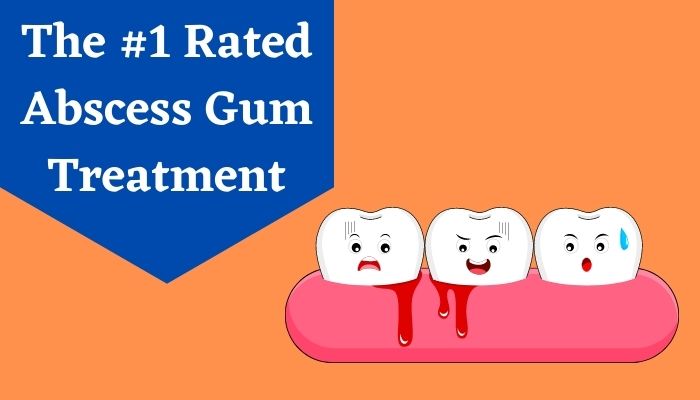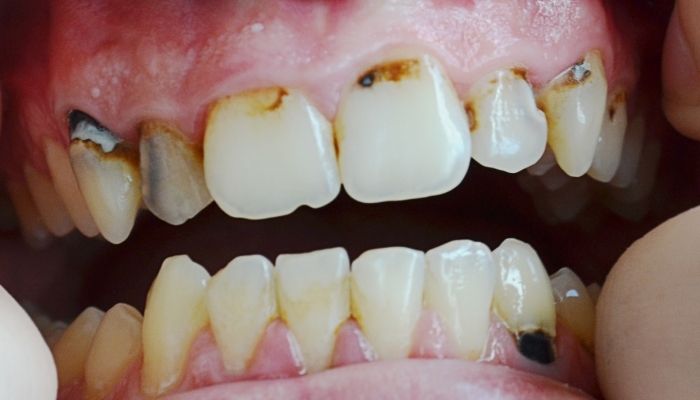Mr. Sanyal (50-years-old) works in a conglomerate in Pune. Though Mr. Sanyal follows healthy oral hygiene, he noticed some pain (particularly in the jaw) and swelling over the past few days. Initially, he took some painkillers to subside the pain. He was normal for some days but again the pain resumed. Then, Mr. Sanyal went to a dentist and after examination; the dentist told him that he has an abscessed gum and tooth problem. The doctor has given some medications and also suggested a root canal treatment to ease the symptoms and pain of an abscess.
Here we are going to discuss what an abscess in the mouth is and how to get rid of an abscessed tooth.
What Is an Abscessed Tooth?
An abscessed tooth is a pocket of pus that can happen in different parts of your tooth due to a bacterial infection. An abscessed tooth generates moderate to severe pain that can sometimes migrate to your ear or neck. If not treated, an abscessed tooth can be lethal and may lead to a life-threatening condition.Abscess Tooth Symptoms
Some prime symptoms are:- Throbbing pain that migrates to your ear, jaw, or neck
- Pain becomes aggravated when you lie down
- Pain while chewing or biting
- Facial redness and swelling
- Swollen gums
- Tooth sensitivity
- Discolored or lose teeth
- Bad breath
- Foul taste
- Tender or swollen lymph
- Fever
Types Of Abscess Gums and Teeth
Let’s take a look at different types of dental abscesses based on location:- Periapical Abscess: This type of abscess is commonly found at the tip of a tooth’s root.
- Periodontal Abscess: This gum abscess is found just next to the root of a tooth. This type of abscess can shift to the nearby tissues and bones.
- Gingival Abscess: This abscess is particularly found on the gums.
Risk factors
Certain factors will enhance your risk of getting a tooth abscess.- Poor Dental Hygiene: If you are not cautious about dental hygiene like not brushing your teeth twice a day and not flossing, then these will uplift your risk of tooth decay, gum disease, tooth abscess, and other dental problems.
- A Sugar-Rich Diet: If you are aficionados of sugary foods and drinks, such as sweets and sodas, you will be more prone to have dental cavities and these will turn to tooth abscesses.
- Dry Mouth: Having a dry mouth will uplift your risk of tooth decay. People usually face dry mouth due to the side effects of certain medications.
How Is It Treated?
The prime goal of an abscess treatment is to clear up the infection and ease the pain. Depending on the severity of your symptoms, your dentist will do a dental x-ray to check whether the infection has spread to other areas or not.Listed below are the various tooth abscess treatment options:
1. Draining The Abscess
By making a small cut in the abscess, your dentist will drain the pus. They will simultaneously clean up the area with a saline solution.2. A Root Canal Procedure
Your doctor will recommend a root canal treatment to alleviate the pain. By drilling the affected tooth, your dentist will extract the infected pulp. After that, your dentist will fill and seal the pulp chamber, and also perform the root canal treatment. The doctor will crown your tooth to strengthen it.3. Tooth Extraction
If there is excessive damage to your tooth, your dentist will extirpate it before draining the abscess. If the tooth can’t be saved, your dentist will remove the tooth and then start the draining process.4. Antibiotics for Tooth Infection
If the infection has spread outside the abscessed area or you have a weakened immune system, your dentist will recommend some antibiotics to clear the infection.5. Removal of Foreign Object
If you have an abscess due to a foreign object in your gums, your dentist will remove it. They will clean up the area with a saline solution.If you can’t visit your dentist, then you may take some over-the-counter anti-inflammatory medications like ibuprofen (Advil, Motrin) to mitigate the pain. By using salt water, you can also rinse your mouth.
Also Read: 8 Best Methods for Healthy Teeth and Gums
Complications
Without any treatment, you can’t get rid of an abscess. If the abscess breaks, the pain will reduce significantly. But still, you need dental treatment. If the abscess is not drained, the infection will spread to other areas, including your jaw, head, and neck. It might lead to sepsis, which can be a life-threatening infection.If your immune system is weaker and you left a tooth abscess without any treatment, your risk of a spreading infection will increase more.
Prevention
To prevent a tooth abscess, you should avoid tooth decay. You should take care of your teeth to avoid tooth decay.- Always consume fluoridated drinking water
- Use fluoride toothpaste while brushing your teeth
- Brush twice a day
- Use dental floss or an interdental cleaner to clean your teeth daily
- Change your toothbrush every three or four months
- Always take healthy food items
- Restrict sugary items and between-meal snacks
- Visit your dentist within 6 months for checkups and professional cleanings
- Use a fluoride mouth rinse to include add-on protection against tooth decay



